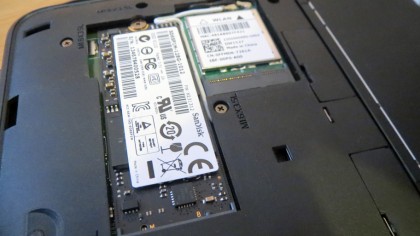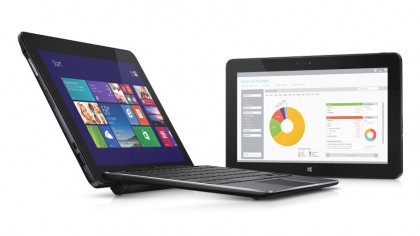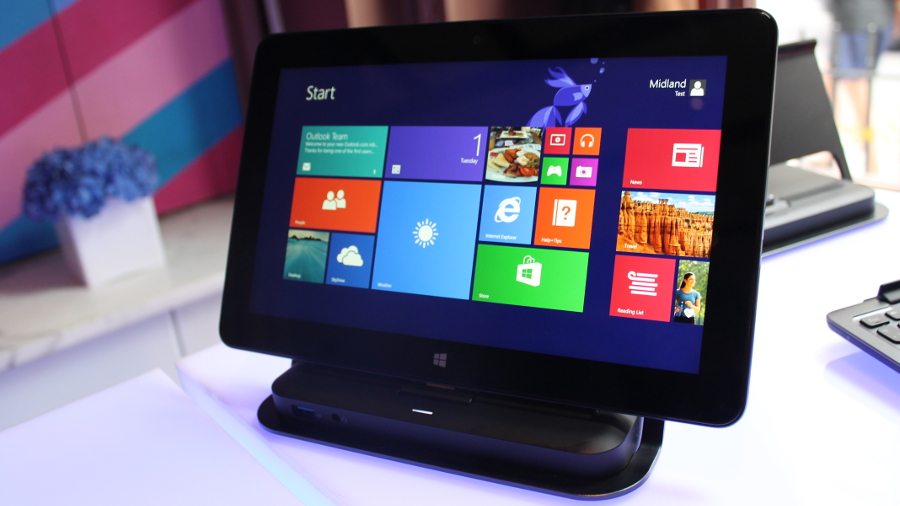TechRadar Verdict
The Dell squares up to the Surface Pro with great versatility, better accessories and a stunning screen, and it's just as good value when bought with its best peripherals. The Surface Pro might be a bit faster, but the Venue has enough power to get the job done – if you need a tablet for work, you won't be disappointed with this.
Pros
- +
Hard-wearing design
- +
interior access
- +
excellent screen
- +
high-quality keyboard accessory
- +
reasonable processor
Cons
- -
Single battery performance mediocre
- -
Surface Pro has a better CPU
- -
cheaper keyboard is poor
- -
heavy, bulky design
- -
poor speakers
Why you can trust TechRadar
Tablets for work are almost as popular as tablets for play, so it's no surprise to see Dell at the forefront of this growing market. Its new Venue 11 Pro 1730 is a flagship corporate machine, and it's got one of the most versatile designs we've seen from any slate.
We've tested the most expensive Venue 11 Pro, which sports a Core i5-4210Y processor. It's Haswell, which means Intel's newest 22nm architecture, but it's an ultra low-power part – its 1.5GHz stock speed, 1.9GHz Turbo peak and dual-core design aren't exactly inspiring. The Surface Pro 2, which is the Dell's closest rival, deploys a Core i5 chip that's usually found in laptops.
Our sample also comes with 4GB of RAM, a 128GB SSD and 2x2 MIMO dual-band 802.11n wireless, but other Venue 11 Pro tablets include slower processors and smaller batteries.
A £629 (about $849, AU$1132) version makes do with a Core i3 processor, and the cheaper £469 (about $780, AU$844) model drops down to a Bay Trail-based Atom CPU with less memory, a smaller SSD, weaker integrated graphics and a 32-bit OS – but, oddly, it's the only Venue 11 Pro with mobile broadband. The base model costs £449 (about $747, AU$808) and has this lesser specification without that extra networking option, so you're stuck with Wi-Fi.
For starters, this is the only tablet we've seen with a removable rear panel. That means the Venue 11 Pro is instantly more manageable than any other tablet and many laptops and Ultrabooks, too. Behind the panel is a removable battery, and it's also possible to get at the SSD and wireless chip – a feature we've never seen on a tablet.

The rear is made from soft-touch plastic that looks good and feels comfortable, and the rest of the Venue is hewn from magnesium alloy, which means excellent build quality. This is a rare tablet with a full-sized USB 3 port, and it's also got micro-HDMI and microSD slots.
Dell also sells several accessories designed to complement this machine. The most exciting is the Tablet Keyboard, which has a laptop-style typing unit and a second battery that's almost as big as the Venue's main power pack. The cheaper Slim Keyboard mimics Microsoft's Surface Pro 2, which has a similar design with a fabric covering and smaller plastic keys.
Sign up to the TechRadar Pro newsletter to get all the top news, opinion, features and guidance your business needs to succeed!

A desktop dock adds three USB 3 ports, several display outputs and a Gigabit Ethernet socket, and there's also a Stylus – but that's not yet available in the UK.
The downside of the Dell's versatile design and broad range of accessories is that this is never a slim or light machine no matter how it's configured. When it's used as a tablet this model weighs 772g and is 13mm from front to back, which is heavier than the Nokia Lumia 2520, with only the 910g Surface Pro 2 proving bulkier.
The situation doesn't improve when those accessories are added. The Slim Keyboard only adds a couple of hundred grams and a few millimetres, but the larger Tablet Keyboard brings the total weight and thickness to 1.57kg and 22mm – as much as a bulky Ultrabook.
Mike has worked as a technology journalist for more than a decade and has written for most of the UK’s big technology titles alongside numerous global outlets. He loves PCs, laptops and any new hardware, and covers everything from the latest business trends to high-end gaming gear.
